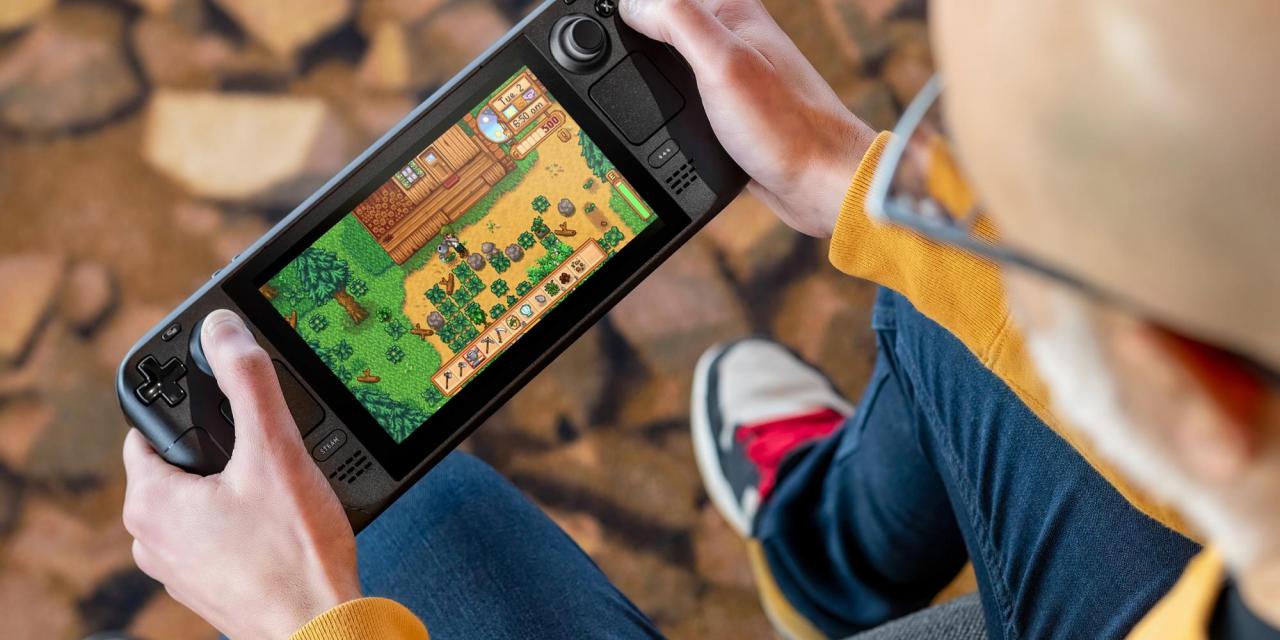
Portable gaming is nothing new, but with the massive success of the Steam Link and the release of the much awaited Asus ROG Ally now only a matter of weeks away, it’s clear we’re on the brink of something new where PC gaming is concerned.
PC gaming has, by its very nature, long been locked into being a stationary pursuit. While traveling gamers could get a modicum of portability with gaming laptops, such devices are large and heavy, so they’re really only useful when you’ve stopped in a location for a while — by which I mean you’re unlikely to bust one out on the bus, or sat waiting for a friend at the park. But that all changed with the Steam Deck.
The Steam Deck was the first time PC gaming has been made truly portable. The sleek handheld form isn’t exactly small, but it’s tiny compared to a desktop PC or gaming laptop, and it truly freed PC gaming from the shackles of a desk. The Asus ROG Ally looks set to follow in those footsteps, adding Windows 11 into the mix, as well as more powerful hardware.
Portable handheld gaming is finally here for PC gamers, but will this be another flop destined to be forgotten, or is this a new revolution? I suspect it’s the latter, and here’s why.
The Steam Deck was just the start
The Steam Deck may be backed by the biggest name in PC gaming, but it’s going to have a heck of a time holding a monopoly on this new market. The Steam Deck will be the first, but it absolutely won’t be the last. The Asus ROG Ally is already almost here, and you can be sure other competitors are waiting in the wings to make their bid for the prize. Traditional PC manufacturers like Nvidia already have form in this area with the Nvidia Shield, a cloud gaming device that could potentially make the swerve to a Steam Deck competitor. Razer is another name that’s close to a shoe-in, having recently released the Android-powered Razer Edge.
But what about brands outside of the traditional PC manufacturers? Flagship smartphone processors are capable of incredible feats these days, so it’s entirely possible we could see a portable PC sporting a mobile processor from Qualcomm. Mobile giant Apple makes its own silicon, as does Samsung, and even Google has been experimenting with its own processors in the last two years of Pixel devices — though the less said about Google’s chances of sticking with a hardware project the better.
Do I think we’re likely to see all of these names make a move? No, not really. Outside of Google, it’s hard to see most manufacturers outside of PC components trying their luck here. But they easily could, and so it’s only a matter of time before someone else does.
They should though, because there’s a strong chance this tech could get even cooler.
Cloud-based saves and 5G can make it seamless
Imagine starting a game on your desktop PC, migrating to your portable PC for the bus ride to work and back, and then settling back to your desktop PC for the evening. You’ve been playing the same save file the whole time, thanks to the magic of data connections and cloud-based saves.
This isn’t even that wild an idea. Steam already supports cloud-based saving, so all this would require would be a data connection inside the Steam Deck.
Is this vital? Absolutely not, you can easily just wait until there’s a Wi-Fi connection before your saves upload, and leaning on a data connection of any sort is rather unrequired. However, it does make the whole experience seamless — and isn’t that we want from the future? Gliding from device to device, a nary a dropped frame between them, able to put down and pick up wherever we left off?
So sure, it’s not vital. But it is cool, and it’s going to be one of the ways I know when the future has arrived.
It’s not just another flash in the pan
The worry for the Steam Deck, Asus ROG Ally, and everything that comes afterwards is that this is all just a flash in the pan. Like cloud gaming and VR (to an extent) before it, everyone will forget about it in a few months time. Its time isn’t now, it’s at some unspecified point in the future.
But that’s not really a problem for portable PC gaming, as it’s not the same. Cloud gaming never had the same appeal and needed a rock solid internet connection, and VR (while awesome) has a high entry point, and relies on developers making games they still aren’t sure will sell. Instead, the Steam Deck and ROG Ally … play the same games you’ll get on Steam. That’s it. There’s no additional barrier to entry for the people making the content, and ultimately, that’s one of the most important hurdles to get over. PC games will keep coming out, and they’ll keep coming to your Steam Deck or ROG Ally, just because they can.
There are still many worries, of course. Battery lives, hardware specs, software … there are still issues to be fixed. But those are on the device-side, meaning they’re likely to be fixed.
The future is now, and the future is portable PC games. I can’t wait.








